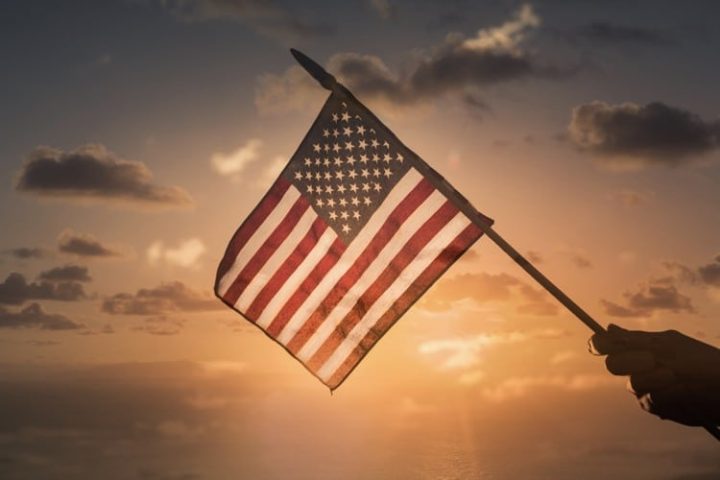
Is America’s old civic order about to be swept away and replaced with a new, and as yet unknown, one in a “Fourth Turning”?
It’s not news to any engaged person that we live in unprecedented times for the American Republic, with burgeoning technology combined with collapsing morality, a cross-border invasion, balkanization, unrest, a cold civil war, insurmountable debt, disease (though exaggerated), increasing tyranny, a faltering family, and waning faith.
It’s also not news that civilizations don’t last forever (though China and India have endured well) and that governments are shorter lived still. And according to commentator Peter Skurkiss, writing on 9/11’s 20th anniversary, our civic order (or disorder) may not be long for this world.
Skurkiss cites the theory propounded by writers William Strauss and Neil Howe in their 1997 book The Fourth Turning, in which they see history as unfolding in repeatable 80- to 100-year cycles. The final one, the fourth, is a turning point, a crisis, that ushers in permanent change — the civilization will never be the same again.
Strauss and Howe aren’t the first to note civilizational cycles. There is, for instance, a certain passage widely disseminated on the Internet and attributed to 17th/18th-century Scottish history professor Alexander Tytler.
“A democracy cannot exist as a permanent form of government,” he warned. “It can only exist until the voters discover that they can vote themselves largesse [handouts] from the public treasury. From that moment on, the majority always votes for the candidates promising the most benefits from the public treasury, with the result that a democracy always collapses over loose fiscal policy, which is always followed by a dictatorship.”
Given that our republic has increasingly taken on a “democratic” character, this should provide pause for thought.
In this vein, Tytler also propounded what’s called The Tytler Cycle. Beginning with a land in bondage, it proposes that civilizations thus transition:
From bondage to spiritual faith;
From spiritual faith to great courage;
From courage to liberty;
From liberty to abundance;
From abundance to complacency;
From complacency to apathy;
From apathy to dependence;
From dependence back into bondage.
(Note that our dependence recently was intensified with “stimulus” payments.)
More recently, and recently even more famously, making the rounds has been a short but unarguable expression of civilizational cycles from combat veteran and post-apocalyptic author G. Michael Hopf. “Hard times create strong men,” he wrote in Those Who Remain. “Strong men create good times. Good times create weak men. And, weak men create hard times.”
Given that weak men abound today, so has talk about hard times and a Fourth Turning. As American Thinker’s Jeff Lukens wrote in May in “The ‘Fourth Turning Crisis’ Has Arrived”:
William Strauss and Neil Howe surveyed history through a generational prism. Their chronicle forms Anglo-American history into seven recurring sequences over the past 500 years. The authors make a weighty claim that generational characteristics follow a similar series of generational phases, or turnings, that climax in a major crisis every 80 years or so.
In their book, each cycle is characterized by the First Turning or the High (which most recently occurred from 1946 to 1964); followed by the Second Turning or the Awakening (1964-1984); then the Third Turning or the Unraveling (1984-2008); and finally, the Fourth Turning or the Crisis (2008 to late 2020s).
Interestingly, the second through fourth turnings closely correlate with the first through third stages of communist subversion, as related by late Soviet defector Yuri Bezmenov, who toured the country for the anti-communist John Birch Society. The first, “demoralization” (undermining of morality), is certainly what occurred during the Awakening (1964-1984) and has continued thenceforth; the second, “destabilization,” is synonymous with the Unraveling (1984-2008); and the third is identified with literally the same term the Fourth Turning is: crisis.
“Crisis” is also defined identically in both cases: a revolutionary period that ushers in a new order.
This isn’t to imply that our current predicament was or wasn’t partially authored by nefarious forces. But the congruence is worth noting.
As for Skurkiss, he points out that each of Strauss’s and Howe’s cycles is called a “saeculum” and then continues:
The saeculum mirrors the seasons of life, expressed as generations move through society…. “The Fourth Turning is a Crisis, a decisive era of secular upheaval, when the values regime propels the replacement of the old civic order with a new one.” This means that the old is swept away, preparing society for something new. From a fourth turning, there is no going back to the pre-crisis normal. A fourth turning puts society on a knife’s edge. It could literally destroy us as a nation and a people. Or it could lead to something better.
As for timing, Strauss and Howe wrote: “The saecular rhythm foretells another American Crisis in the first quarter of the twenty-first century.” Continuing: “The next Crisis era will most likely extend roughly from the middle of the Oh-Ohs [2000-2010] to the mid-2020s. Its climax is not likely to occur before 2005 or later than 2025.”
We’re in that timeframe right now. Remember, The Fourth Turning was written in 1997.
To add some clarity, the Third Turning is a period in which people lose faith in their civilization’s institutions. This, of course, began happening long ago, with Americans’ confidence in government, media, the scientific establishment, entertainment, religion, etc. bottoming out.
But further clarification requires simplification. Putting aside cycle talk, turnings, and theories, the bottom line is this: All life must be governed by “rules.” Bees, lions, bison, wolves, and other creatures exhibit behavior patterns and “know what to do,” led as they are by the “rules” of nature and nature’s God. So must man be thus governed; this implies not just governmental rules but also social ones — codes, traditions, and conventions.
Now, there are problems when rules start breaking down. What would happen, for example, if instead of agreeing to abide by baseball’s rules, those participating embraced the credo “If it feels good, do it”? What would ensue if they fancied that since everything is relative, why be constrained by rules we find inconvenient?
If even baseball’s governing bodies ceased emphasizing “the rule of law” and instead gamed the system in favor of friends and allies and enforcement generally was lacking, flouting of rules would create anger and lead to reactive flouting. If this degeneration continued long enough, it could reach a point where the players, enraged and unconstrained, were swinging the bats at each other.
This is a metaphor for our civilization’s woes. Permeated by moral relativism/nihilism (“There are no moral rules”), we’re descending toward moral anarchy. This is what begins occurring during demoralization/Second Turning-destabilization/Third Turning periods.
Yet to paraphrase economist Herb Stein, “If something can’t go on, it won’t.” A Fourth Turning is when it no longer can or does. In the above analogy, if baseball were to continue, a “controlling legal authority” would step into the breach and restore order.
So it is with civilization. The irony of the decadent Left’s attack on morals is that the kind of regime its agitators would usher in wouldn’t tolerate their destabilizing habits precisely because tyrants don’t want their apple cart overturned (destabilization is for use on other people’s apple carts). This is why China today is clamping down on sexual devolutionary entertainment — among other things, prohibiting on TV what Beijing calls “sissy men” — but surely would encourage these forces in America.
And as our “rules” continuing breaking down, we are surely heading toward a collapse. What will emerge from this tragedy, the first 1984 or another 1776, is up to us. After all, man possesses free will and may exercise that will for good or ill.



